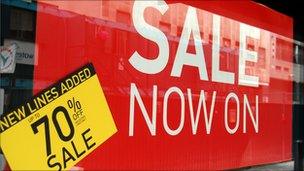UK retail sales fall in September
- Published

A growing number of retailers are warning of tough trading conditions on the High Street
UK retail sales fell again September, the second month in succession they have declined, official data has shown.
Sales last month were 0.2% lower than August, led by falls in clothing and car fuel sales, said the Office for National Statistics (ONS).
The ONS also revised down August's decline, saying sales that month slipped by 0.7% compared with its original calculation of 0.5%.
The data comes as a number of retailers have warned of weak trading conditions.
On Wednesday, both Argos-owner Home Retail Group, and sportswear chain Sports Direct commented on "challenging" trading conditions.
On Thursday, department store group Debenhams reported a 16% rise in pre-tax profits to £139.9m for the year to 28 August, but said it remained "concerned about the general retail environment".
The ONS said that, compared with the same month last year, sales in September were 0.5% higher. However, this was below analysts' expectations of a 1% rise.
Excluding petrol and diesel, retail sales last month were unchanged from August, and 1.8% higher than in September 2009.
Samuel Tombs, UK economist at Capital Economics, said the latest ONS figures "provide yet more evidence to suggest that consumers are starting to rein in their expenditure even before the fiscal squeeze has begun".
Bank action?
The British Chambers of Commerce said there was "no need for undue pessimism" because the pace of annual retail growth was still faster than a year ago.
However, it said it was important that the government and Bank of England moved to help consumers and the wider economy ahead of VAT rising to 20% in January, and before the impact of the government's spending cuts start to be felt.
Earlier this week, Bank of England governor Mervyn King raised hopes that the Bank may inject more money into the economy through its process of quantitative easing (QE).
He said that at present the amount of money in the economy was still "barely growing at all", and added that it was a "key role" for the Bank to provide stimulus when the economy was in need.
The Bank has so far put £200bn into the economy through QE.
Some economists now expect the Bank could inject at least another £100bn into the economy following the next meeting of its Monetary Policy Committee at the start of November.
- Published20 October 2010
- Published20 October 2010